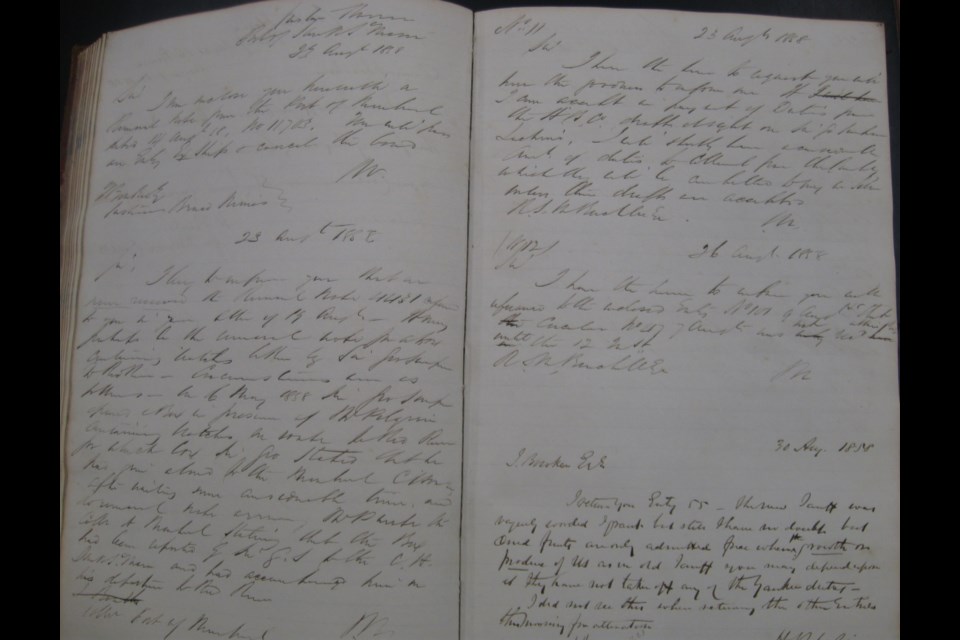From the archives of the Sault Ste. Marie Public Library:
*************************
Remember This … Joseph Wilson
Joseph Wilson’s father, George Wilson, was a lieutenant in the British Navy and upon his retirement decided to move his family to Canada in 1832 where land was free for soldiers.
The family included George Wilson and his wife, Mary March, as well as their children Joseph (14), William (12), George (10) and their youngest Mary. Mary (March) Wilson’s father, William March, her mother and her sister, Jane March accompanied the Wilson family on their move to Canada. Choosing to settle in Medonite Township, the Wilson family proceeded to Toronto and loaded up their belongings before travelling by oxen to their new log home, named Marchburn after his wife Mary March. After spending the winter in Ottawa, Mary’s mother and sister joined them during the following spring.
Unfortunately, her father, William March, died of cholera during his first winter in Canada.
Joseph Wilson was born on March 18, 1818 in Perthshire, Scotland and followed in his father’s military footsteps by joining the militia. He saw combat in the Rebellion of 1837 that took place later that year.
George Wilson was appointed Collector of Customs and his son Joseph Wilson acted as the Deputy Customs Official in 1843. According to family recollections Joseph Wilson was appointed Collector of Customs for the Port of Sault Ste. Marie and moved to the area the following year. When Joseph Wilson arrived in Sault Ste. Marie he found that the only white people in the area were Hudson’s Bay Company employees and one other white resident. Jane March who was Joseph’s aunt moved to Sault Ste. Marie and served as his housekeeper.
A year after his arrival he built a cedar log home on his property which was located in the area that now encompasses Elgin, March and Spring Streets and named it Marchbank after his Aunt Jane. Over the years the house was expanded to suit Wilson’s needs and would become the centre of hospitality for Sault Ste. Marie.
During his time as a Collector of Customs it is said Wilson virtually ran the Sault. He filled the following roles — representative of the government to the First Nations, an arbiter in disputes, control of Crown Land, doctor, overseer of fisheries and commander of the militia.
He formed a half battery of mountain artillery made up of 20 men. He was known as Captain Wilson but he received the title of Major Wilson for his role in the formation of this militia unit.
During the mid-1800s he felt that a lack of formal government structure and the inability of settlers to purchase their own land were key stumbling blocks for the settlement of Sault Ste. Marie so he worked very hard to correct these issues. He pushed for a land survey to be done that would allow settlers to purchase land. He also proposed the establishment of a district judiciary which was accomplished in 1858 with the formation of the Judicial District of Algoma.
He married Caroline Louisa Sherman and together they had one daughter named Jenny. In 1893 he built a cottage as a wedding gift for his daughter at 444 Bay Street.
Rev. Capp, author of the Annals of Sault Ste. Marie related a story from Wilson’s Diary, which was later destroyed in a fire at City Hall.
An American citizen named Philetus Church who lived on Sugar Island was cutting timber on the Canadian side and Wilson helped him attach the timber. When Wilson crossed to the American side on March 18, 1848, he was arrested and thrown in jail with no explanation. An officer finally arrived with papers for Wilson to sign providing authority for Church to remove the timber he had cut, not Wilson. He was told that if he signed the forms he would be released. Wilson however refused to sign it saying “he would rather starve than be party to such rascality.” Wilson remained in jail until the 20th of March when the authorities realized what had occurred and released him. The townspeople on the Canadian side of the river had no idea what had happened to him or where he was for those days. Wilson complained to his headquarters and soon received an apology from Washington.
Joseph Wilson died March 11, 1904 at the age of 87. His house remained standing until 1931 when it was demolished to build the Eaton store, located at the corner of Queen Street and lower March Street.
His daughter’s house was demolished in 1974 to make way for a parking lot, although the sandstone retaining wall can still be seen today.
Although very little might remain physically from his time he nonetheless made a lasting impact on the city and its citizens.
*************************
Each week, the Sault Ste. Marie Public Library and its Archives provides SooToday readers with a glimpse of the city’s past.
Find out more of what the Public Library has to offer at www.ssmpl.ca and look for more Remember This? columns here
